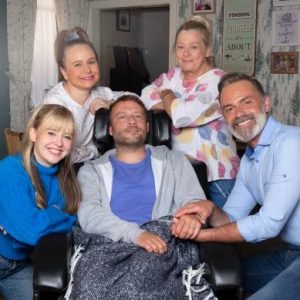In a heart-wrenching moment that gripped the audience, Billy Mayhew’s morning began with an
overwhelming sense of loss and confusion, as depicted in the latest episode of “Corrie.” The scene opens
with Billy waking up on the sofa, his body stiff and his mind clouded with a haze of dread. The
comfortable cushions of the sofa, which had once served as a place of rest and relaxation, now felt foreign and unforgiving, reflecting the tumultuous emotional state Billy found himself in. As he gradually became more aware of his surroundings, his eyes fell upon a stark, painful reminder of his recent tragedy: Paul Foreman’s empty wheelchair.

The sight of the wheelchair was a brutal jolt to Billy’s already shattered heart. It stood there as a silent testament to Paul’s absence, an empty vessel where Paul had once been. The wheelchair, once a symbol of Paul’s resilience and his struggle with disability, now served as a cruel reminder of the void left by his death. For Billy, the wheelchair was not just a piece of furniture but a poignant symbol of his partner’s struggle, their shared journey, and the unbearable finality of his loss.
Billy’s emotional state was a complex mixture of grief, guilt, and helplessness. His feelings of sorrow were intensified by the haunting knowledge that he had not been by Paul’s side when he took his last breath. The guilt of not being present during Paul’s final moments weighed heavily on him, amplifying his sense of loss. He grappled with the notion that, in his most vulnerable and critical moment, he was absent. This realization struck him with the force of a heavy blow, leaving him feeling isolated and engulfed by his emotions.
In the days leading up to Paul’s death, Billy had been consumed by various personal and external pressures, which had inadvertently led to his physical absence at the most crucial time. The weight of these pressures seemed to bear down on him, exacerbating his feelings of inadequacy and remorse. The emotional burden of not having been there to provide comfort, solace, or closure during Paul’s final hours was a heavy cross to bear. Billy was now left with the profound and unsettling task of reconciling with the reality of his absence, a reality that seemed impossibly harsh and unforgiving.
Billy’s struggle to cope with his pain was further complicated by the rawness of his grief. It was as though his emotional faculties had been overwhelmed by a torrent of feelings that he could neither fully understand nor articulate. The complexities of grief are often difficult to navigate, and for Billy, the challenge was compounded by the additional layer of guilt that accompanied his loss. Each moment of reflection, each glance at the empty wheelchair, served as a reminder of what had been lost and what he had failed to provide.
The portrayal of Billy’s anguish was a poignant reminder of the multifaceted nature of grief and the profound impact that loss can have on those left behind. His internal battle, marked by an intense sense of guilt and sorrow, was a testament to the depth of his love for Paul and the harsh reality of dealing with loss. It underscored the difficulty of facing the aftermath of a loved one’s death, especially when compounded by the feelings of regret and the burden of missed moments.
As Billy continued to stare at the empty wheelchair, the enormity of his emotions seemed to overwhelm him, leaving him in a state of paralysis. The once comforting familiarity of his surroundings now felt cold and indifferent, accentuating his sense of isolation. His mind was a whirlwind of thoughts and feelings, struggling to come to terms with the finality of Paul’s passing and the circumstances surrounding it.
The scene served as a powerful exploration of the personal impact of grief and the challenges of processing complex emotions. It highlighted the often-unspoken agony of not being present during a loved one’s final moments and the struggle to cope with such profound loss. Billy’s journey, marked by deep sorrow and self-reproach, provided a raw and unfiltered look at the human experience of dealing with death and the lingering echoes of regret that often accompany it.
In summary, the latest episode of “Corrie” delved deeply into the emotional turmoil experienced by Billy Mayhew following the death of his partner, Paul Foreman. The poignant image of Paul’s empty wheelchair served as a powerful symbol of loss and regret, capturing the essence of Billy’s profound grief and the complexity of his feelings. The scene was a moving depiction of how personal tragedy and emotional absence can intertwine to create a multifaceted and deeply painful experience.





